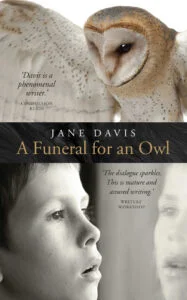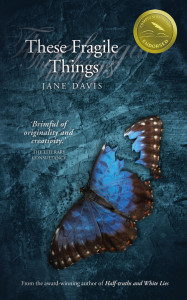Award-winning British novelist Jane Davis shares her opinions on book piracy, explaining why she refuses to follow common advice to disregard it and describing her coping strategy.
The received wisdom for authors who find their ebooks advertised as free downloads on third party websites is simple. ‘Ignore it,’ we are told.
- ‘Copyright infringement is a fact of life.’
- ‘It doesn’t matter how readers find you, it just matters that they find you.’
- ‘Most of those sites don’t actually have your content. They are just mining your clicks for ads or queuing up malware for download.’
I was never comfortable with that advice.
I used to spend hours trawling the internet every month and issuing countless cease and desist letters. But, for the past couple of months, I have been beta testing a piece of software called Blasty. It’s very simple. You add details of the content you want to protect (there is no limit) and are notified when copyright infringements are identified. You review the sites, then use a big orange button to ‘blast’ them, i.e. in the words of Blasty's website:
“a copyright removal procedure under the DMCA (Digital Millenium Copyright Act) is automatically initiated, resulting in the complete elimination of the infringing webpage from Google on a worldwide basis”
Why Copyright Infringement Matters
To date, to the best of my knowledge, no one has taken my work and passed it off as their own, although on several websites, other names appear alongside mine as ‘author’. In my mind, what they’re doing is far worse. They have obtained, or not, as the case may be, a copy of my work and are:
- distributing it illegally, allocating a new ISBN number, retaining what should be my profit, or
- using my name to entice people onto their site
No author will dispute the importance of brand. We invest heavily in it, identifying the various elements of it, building those elements into website and cover designs, and into every post we put out there. My name is my brand, my reputation. I want it to be associated with trust. I am sure you feel equally protective of yours.
Why I Refuse to Ignore It
a) It is Done in my Name
If someone is enticed to sign up for a fake subscription service by the offer of one of my books, I cannot simply distance myself. It is my problem. My name is associated with the transaction.
b) The Risk to Readers
Your potential reader, who has chosen your book out of all of the thousands of free books that are available, becomes a victim. They may be asked to enter bank account details when they subscribe. Files disguised as ebooks may contain computer viruses or pornography. Cyber criminals will hack through a computer’s defences and install malware. Industry watchdogs warn that websites offering pirate copies and ‘something for nothing’ attractions are more likely to be infected. ‘Free’ should be the big flashing warning light. But if ‘free’ is commonplace, warning signals no longer operate.
c) The Scourge of Free Books
The fact is that these scams wouldn’t work were a substantial number of eBooks not available for free.
I don’t want my name to be associated with the word ‘free’. With seven titles to my name, I now make less money from my books than I did with my first two releases. I would like to push my prices up. I need to push my prices up. But here’s what I’m up against:
- ‘Free ebooks for Life!’
- ‘The good news is that it’s possible to find tonnes of great ebooks without paying a penny.’
- ‘You’ve got an ebook reader (or a laptop or netbook with ebook reading software) now you just need some free books to put it to good use.’
A recent survey by Ofcom and Kantar Media found that in the UK 61% of ebooks are read for free.
My own research reveals that:
- 50% of ereader users who describe themselves as book lovers happily admit that they never pay for a book
- Many would be mortified to learn that the author has not authorised the free distribution, and those who are only too aware that what they’re doing is wrong
Advice abounds on the internet about the ease of stealing files. ‘Tens of thousands of new releases and best-sellers are readily available on BitTorrent sites, right next to movies and music.’ These same sites and advice forums give step-by-step instructions on how to convert files and get them onto a Kindle, explaining that Amazon ‘ignored all ebook standards when building the Kindle, instead going with a proprietary format created by Mobipocket, a company they acquired in 2005.’ Great news for readers! ‘You may be charged 10c for delivery,’ they warn.
People have been persuaded that free is legitimate. After all, everybody’s doing it. But what if it’s not? Remember, of all the free ebooks out there, readers have still chosen ours.
How to Spot a Pirate Site
One thing that I have learned by using Blasty is that it’s not as easy as you might think to spot a pirate site. Many sites claim to actively support authors or include statements, often in legalese, that make them look official. Several display my author bio and my official author photo. The sites draw reviews directly from Goodreads. Not only does my name appear, but (here’s where I get really angry) so do the names and profile photos of those who have been kind enough to post reviews. And here’s a nice touch: some of those same sites includes a copyright notice about their content.
Think about the demographics of people who use ereaders. One of the largest group of readers is the elderly. Would your mother be fooled? I don’t have to think about the answer. Mine fell for a PayPal scam email last week.
What Can Indie Authors Do About Piracy?
- Make it easy for readers to discover your work
- If you publish on multiple sites, consider giving readers a universal link for all of the places where they can legitimately find your titles
- Talk about the risks
- Talk about ebook pricing
- Talk about ‘free'
In addition, I've signed up to be a beta tester for Blasty. 319 blasts so far. And counting…
A footnote from our Watchdog, which will be assessing Blasty for inclusion in ALLi's approved list of tools for indie authors once the service moves out of beta testing and goes live: “Blasty treats the symptoms of piracy, not the disease. Therefore while I think Blasty is a good service, it's a limited solution, and authors need to be aware that this isn't a cure-all for piracy.”
OVER TO YOU If you've experienced piracy and would like to tell us the outcome, we'd love to hear from you – especially if you have been successful in beating the pirates.
#Authors - how do you deal with book piracy? @JaneDavisAuthor describes her strategy Share on XLIKE TO KNOW ABOUT LEGAL RIGHTS FOR AUTHORS? CHECK OUT THIS POST:








[…] Opinion: What Should Indie Authors Do About Book Pirating? Author Jane Davis Shares Her Views […]
Things have taken a strange turn for the Blasty Service. I was also a Beta tester and was initially impressed, but as soon as I signed up to their ‘Full Power’ service it seemed like the software stopped working. Blasts slowed and I lost control of what was removed because I’d clicked ‘Auto Blast’.
From 18-22 March 2019 the site vanished completely- with just an error report on the page. This got authors discussing their experiences with the service on social media and it became clear all was not well. Credit card were still charged even though the site was gone. The owner Olivier Zetlers has apparently ghosted authors for months when they complained about the service and lack of proof that Blasts were taking place at all. Many authors reported that they’d had no blast reports for months and when they searched Google they found links that were supposed to have been removed by Blasty.
I was becoming concerned myself that the site wasn’t actually doing anything and we were being scammed. I added my new release to Blasty a month before the site vanished and had not received any reports of that book being pirated. However, I found many pirated links myself- and when I put the title into Muso, that software found 14 more links- and Blasty found none.
The site reappeared on 22nd March, but the help page ‘no longer exists’. There is no button to cancel subscriptions and I cannot even remove my credit card details from the site. The lack of transparency is alarming and Blasty has lost my trust. I want to cancel my subscription but without a help page I can’t find out how to do so. I would advise authors to avoid this site as they have serious issues that they are ignoring- yet are still charging authors.
[…] Opinion: What Should Indie Authors Do About Book Pirating? Author Jane Davis Shares Her Views […]
[…] Opinion: What Should Indie Authors Do About Book Pirating? Author Jane Davis Shares Her Views […]
[…] Opinion: What Should Indie Authors Do About Book Pirating? Author Jane Davis Shares Her Views […]
For my debut novel, Pride’s Children, Blasty has blasted over 2000 infringements.
It’s a bit of work, because I have to authorize each one, but there has a pattern to it, and I can do the Blasts quickly now.
I have deliberately never set my novel to free; this makes it easy to identify sites which do (I’ve blogged about that at https://liebjabberings.wordpress.com/2016/09/19/the-odd-reason-prides-children-will-never-be-free/).
The infringements spring up like mushrooms after rain; it is disheartening.
I don’t have enough books published yet to be concerned about piracy, though I suppose all it really takes is one. Hmmm…maybe I should educate myself on this matter. However, I also agree the issue needs to be addressed. Any tools, no matter if they’re comprehensive or not, and no matter whether they treat the symptom of the cause of a problem, should be considered as building blocks to fight back against copyright infringement or any other illegal action against authors. It’s tough enough operating in a selling environment where free is all the rage (though it does have its value for proving an author’s brand). Nevertheless, to have piracy damage any author’s business model is disgraceful. The large scope of a problem should not prevent authors and their supporters from trying to tackle it. Great post, Jane.
Wow the number of blasts people are making is frightening. I had no idea there were that many sites pirating books. I also don’t know whether my books are being pirated or not. I figure I’m not well known enough for people to bother so I’ve never checked. Maybe I should. Thanks for the article.
A small correction: As for 61% percent of people who download for free being mortified, my article read ‘Of that 50 – 61% there are those who would be mortified to learn that the author has not authorised the free distribution, and those who are only too aware that what they’re doing is wrong.’ This would be very precise research. I didn’t delve quite that deeply!
I can endorse Blasty, too. Been using it for a couple of months.
Just signed up, Jane! Thank you for telling us about it.
I agree with Kassandra that it would be fantastic if Blasty sent out an automated cease and desist notice. The problem is these motices have to be personalised and that means all sots of merge functions. Maybe it’ll come…
I’m using Blasty too and, so far, I’m pretty happy with it. I agree there is no complete solution for piracy, any more than there’s a permanent cure for malware. But it sure makes life easier.
All good points, Jane. I too am now using Blasty, and loving it. I know it’s not a fix all, since it doesn’t send out cease and desist notices (I wish it did!) But it helps to get the sites blocked on Google.
The time factor keeps me from being willing to do more than that though. If readers get burned a few times by these sites, hopefully they will learn. I have trouble feeling too sorry for them when they so eagerly embrace “free” while just as eagerly telling me to keep writing.
P.S. those running Blasty, could you set it up so authors can upload a cease and desist letter that they can then automatically send out to these sites with the push of a button?
Thanks, Jane.
I agree with you. Piracy should be stopped. We’ll never get rid of these thieves entirely, but Blasty is a great start. I currently have 571 blasts in progress and 369 completed. The process beats working by hand.
I wrote an open letter to book pirates: http://kathysteinemann.com/Musings/piracy/
Who knows whether it will have any affect, but I’m not willing to sit back and let pirates steamroll over my hard work.
Ouch! I can’t believe I used affect instead of effect.